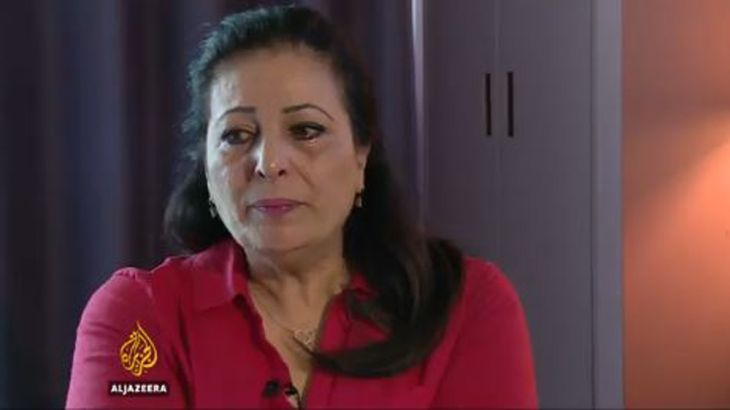Syria war: Speaking out on ‘sadistic’ government jails
Hanada al-Refai tells Al Jazeera about being tortured, losing her brother, and her campaign to free political prisoners.

A woman who says she was jailed in Syria for seven months has revealed the extent of torture she and her brother – who was killed in prison – suffered at the hands of Bashar al-Assad’s government.
I want to be a voice for the victims of this war. The conditions in jail are very sadistic, very criminal
From being forced to eat from toilet pots and being interrogated in a room covered in vomit and blood, to being badly beaten for days on end and receiving constant death threats, activist Hanada al-Refai said the treatment meted out to her was inhuman.
Keep reading
list of 4 itemsMasked Tunisian police arrest prominent lawyer for media comments
Gaza’s mass graves: Is the truth being uncovered?
Tunisia: The migration trap
“I want to be a voice for the victims of this war,” she told Al Jazeera, speaking in Geneva where the latest round of peace talks are being held. “The conditions [in jail] are very sadistic, very criminal.”
Refai on Thursday appeared on a panel in the Swiss city at an exhibition of photographs smuggled out of Damascus by a former military photographer code-named “Caesar”. Also speaking on the panel were other Syrian activists and Britain’s special representative for Syria.
Refai was a teacher, but when the uprising began she seized the opportunity to join peaceful protests.
READ MORE: Yazidis tell horror stories about ISIL captivity
“Before I was just a wife, mother and teacher. At that time I wasn’t interested in politics, it was a red line. But we were hoping that we [Syrians] had the courage to have a revolution, like Egypt,” she said.
“I started to be an activist when the revolution started from Deraa, my city. We call it the cradle of the revolution.”
She collected videos of demonstrations and posted them online to “show the world what was going on in Syria”.
‘I saw men die’
But on March 15, 2012, she says she was arrested as she tried to run away from officers manning a checkpoint in Nabak. She was held in Harsata, an Air Force Intelligence base.
“I thought they wouldn’t beat me. I am grandma, a teacher, a woman … [But] they took me inside, covered my eyes and tied my hands behind my back.”
The prison officers then forced her into a crouching position.
READ MORE: Syria detainees face ‘systematic torture’
“I was stuck and couldn’t move,” she said. “They turned me so that my face was on the floor and my legs were up. They took off my shoes and socks and started beating my feet with a stick. I don’t know for how long … I was screaming like hell. I have never screamed like this, even when I had each of my four children.”
Most of the other prisoners were men, many of whom began to suffer from mental illness, a condition al-Refai says she came to envy as the torture intensified.
“I saw a lot of men, they got crazy. We used to feel very jealous of them that now they were happy. They don’t know what was going on. I saw men die,” she said.
Others were hung from the ceiling as punishment for not giving information.
“Why would they deprive me from my family for seven months? Just because I asked for freedom? For dignity?” she said. “While they were beating me, they said, ‘What more freedom do you want? You don’t have to wear hijab, you drive a car, you went to university. This was all a favour from his excellency.'”
Brother killed
Her brother Naef, a military judge, visited her two days after she was jailed. But a week later, he was also arrested. Two years and two months into his imprisonment, he was killed.
“He studied law, he wanted fairness and justice,” she said. “But he couldn’t get justice for himself. I tried everything to save him but I couldn’t and he died. They killed him.”
Naef’s body has not been returned to the family.
“When I talk about him, I’m talking about them all [political prisoners in Syria]. We have to save whoever is still alive, set them free,” said Refai. “I won’t ask for the impossible, to bring him back to life. But at least I want my brother’s body back. He deserves to have a grave like any human being.”
READ MORE: Up to 7,000 Syrians tortured or killed in detention
There are no verifiable statistics on how many people have been jailed since the war started in 2011. But by some estimates more than 200,000 people may have been held as political prisoners, including thousands of women and children.
“In seven months, I met 65 women aged from 12 to 85 years old,” Refai said, adding that the child was detained because her father fled the army, and the 85-year-old because her son had left.
She also met female university students in jail, and believes the government uses women “as a weapon of war”.
The threat of rape silences dissent, she explained.
“They [the university students] were scared of the regime and of society. They think, ‘Who will want to marry me?’ Even if nobody rapes them, others might think maybe somebody touched them.”
Refai has now vowed to campaign for the release of all political prisoners, especially women and children.
Asked what she thought should happen to those who ordered torture, she said: “They must be punished. For me or those who are relatives of detained, at least we need to know there is justice on planet earth. We don’t want to wait for heaven for a judgement from God. They must be judged now, on earth.”